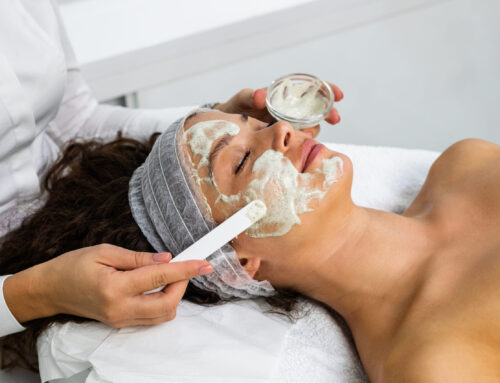In recent years, chemical peels have become a popular skincare treatment for addressing a wide range of skin concerns, from acne to aging signs. However, when it comes to individuals with darker skin tones, questions like, “Are chemical peels safe for dark skin?” often arise. Is it safe to undergo a chemical peel if you have dark skin?
In this comprehensive guide, we will explore the world of chemical peels and their safety for dark skin.
Understanding Chemical Peels
Before delving into the specifics of chemical peels for dark skin, let’s first understand what chemical peels are and what they aim to achieve. Chemical peels are cosmetic treatments that involve the application of chemical solutions to the skin to exfoliate and rejuvenate it. These peels come in various types, including superficial, medium, and deep, each with its own purpose and intensity.
Superficial peels are gentler and mainly target the outermost layer of the skin, providing a mild exfoliation. Medium peels penetrate deeper, addressing issues like fine lines and pigmentation. Deep peels are the most intensive and are typically used for severe skin concerns. Common skin problems that chemical peels can address include acne, hyperpigmentation, and signs of aging.
Skin Types and Variations
Skin comes in a beautiful array of tones and shades, from fair to medium to dark. People with darker skin often possess unique characteristics, such as a higher concentration of melanin, which can result in specific skincare needs and challenges. It’s crucial to understand these differences before considering a chemical peel.
Individuals with dark skin may be more prone to issues like post-inflammatory hyperpigmentation (PIH) and keloid scarring, which are important factors to consider when thinking about chemical peels. However, it’s important to remember that everyone’s skin is unique, and how your skin responds to a chemical peel will depend on various factors, including your skin type, the type of peel used, and the expertise of the professional administering the treatment.
The Safety Concerns
One of the most significant misconceptions surrounding chemical peels for dark skin is the fear of complications, such as worsening hyperpigmentation or scarring. While these concerns are valid, it’s essential to recognize that when performed by a qualified and experienced dermatologist or skincare professional, the risks associated with chemical peels can be minimized.
Hyperpigmentation is a commonly cited concern, but the risk is typically higher with deeper peels. A skilled professional will assess your skin type and recommend the most appropriate peel strength to reduce this risk. Furthermore, advancements in skincare techniques and technologies have led to a decrease in complications for individuals with dark skin.
Benefits of Chemical Peels for Dark Skin
Amidst the safety concerns, it’s crucial to acknowledge the potential benefits of chemical peels for individuals with dark skin. These treatments can effectively target a range of issues that disproportionately affect darker skin tones, including melasma, acne scars, and uneven skin tone. In many cases, chemical peels have helped individuals achieve clearer, more radiant skin.
How to Safely Use Chemical Peels on Dark Skin Tones
Safely using chemical peels on dark skin tones, often referred to as ethnic or black skin, requires a nuanced approach that takes into account the unique characteristics of darker skin types. Unlike lighter skin tones, black skin contains higher levels of melanin, the pigment responsible for its rich hue. Melanin plays a crucial role in protecting the skin from harmful UV radiation, but it also poses challenges when performing chemical peels, as excessive inflammation or improper exfoliation can lead to post-inflammatory hyperpigmentation. To mitigate these risks, skincare professionals must select the appropriate peel type and strength, consider the patient’s skin sensitivity, and implement meticulous aftercare routines. By understanding the intricacies of black skin and its underlying skin cells, it is possible to achieve safe and effective chemical peel treatments that reveal healthier, more radiant skin.
Choosing the Right Professional
When considering a chemical peel, regardless of your skin tone, selecting the right professional is paramount. Here are some tips for finding a qualified dermatologist or skincare specialist:
Ask for recommendations from trusted friends or family members.
Research potential providers online, checking their credentials and reviews.
Schedule consultations with multiple professionals to discuss your concerns and treatment options.
Ensure the professional has experience working with individuals with dark skin and is familiar with the specific challenges it may present.
Remember that an experienced professional will assess your skin, recommend an appropriate peel type and strength, and provide comprehensive guidance on pre-treatment and post-treatment care.
Preparation and Aftercare
To maximize the safety and effectiveness of your chemical peel, it’s essential to follow the recommended pre-treatment and post-treatment guidelines provided by your skincare professional. Here’s a general overview of what to expect:
Pre-Treatment:
Discontinue use of certain skincare products, like retinoids, prior to the peel.
Protect your skin from sun exposure and apply broad-spectrum sunscreen daily.
Share your medical history and any current medications with your provider to ensure safe treatment.
Post-Treatment:
Expect some downtime, depending on the type of peel you receive.
Follow your provider’s instructions for cleansing, moisturizing, and protecting your skin.
Be diligent about sun protection, as your skin will be more sensitive to UV radiation.
Attend follow-up appointments as recommended to monitor your progress.
Realize that the recovery time and results can vary based on the type of peel and your skin’s response. Some peels may require only a few days of recovery, while others may take a few weeks.
Real-Life Experiences
To provide a balanced perspective, let’s explore a few real-life experiences of individuals with dark skin who have undergone chemical peels:
Positive Experience:
Sarah, who has a medium-dark complexion, had struggled with stubborn acne scars for years. After consulting with a dermatologist, she decided to try a series of medium-depth chemical peels. She diligently followed her aftercare plan and saw remarkable improvement in her skin texture and tone. “I never thought my skin could look this good,” she exclaimed.
Challenges Faced:
On the other hand, John, who has deep skin tones, experienced some challenges with his chemical peel journey. He developed mild post-inflammatory hyperpigmentation after his first peel. However, with the guidance of his dermatologist, he adjusted his aftercare routine and proceeded with caution for subsequent peels, eventually achieving his desired results.
These stories highlight that while there can be challenges, chemical peels can be safe and effective for individuals with dark skin when approached with care and guidance from a qualified professional.
Alternative Treatments
If you remain hesitant about chemical peels, rest assured that there are alternative skincare treatments available for individuals with dark skin. These include:
- Microdermabrasion: A non-invasive exfoliation technique that can improve skin texture and reduce mild pigmentation issues.
- Laser Therapy: Various laser treatments can target specific skin concerns, such as hyperpigmentation, without the use of chemicals.
- Topical Skincare Products: Prescription-strength skincare products containing ingredients like retinoids, hydroquinone, and vitamin C can help improve skin tone and texture over time.
Ultimately, the choice of treatment will depend on your specific skincare goals and comfort level with different procedures.
Conclusion
In conclusion, chemical peels can be safe and effective for individuals with dark skin when approached with caution, performed by a qualified professional, and accompanied by diligent pre-treatment and post-treatment care. While there are risks, they can be minimized through personalized treatment plans and the expertise of skincare professionals. Visit our blog page now to get daily skin care routine tips!
Remember that your skin is unique, and results may vary, but with the right guidance, you can achieve healthier, more radiant skin. Make informed decisions, prioritize your skin’s health, and embrace the possibilities that chemical peels can offer for individuals with dark skin.
If you’re considering a chemical peel, consult with a reputable dermatologist or skincare specialist who has experience working with individuals with dark skin. Don’t let doubts hold you back from flawless skin—experience the transformative power of chemical peels at Skin & Soul Medspa! Our team specializes in catering to diverse skin tones, guaranteeing your safety and satisfaction. Join us on a journey to vibrant, blemish-free skin by scheduling your appointment now!
FAQs: Are Chemical Peels Safe for Dark Skin
Are chemical peels safe for all types of dark skin?
Yes, chemical peels can be safe for individuals with dark skin when administered by experienced professionals who consider your specific skin type and needs. Different peel strengths and types are available to accommodate various skin tones.
Can chemical peels worsen hyperpigmentation in dark skin?
While there is a risk of post-inflammatory hyperpigmentation (PIH), a skilled professional can minimize this risk by choosing the right peel strength and providing proper aftercare guidance. Many individuals with dark skin have successfully undergone chemical peels to address pigmentation issues.
How long does it take to recover from a chemical peel for dark skin?
The recovery time varies depending on the type of peel. Superficial peels typically require minimal downtime, while deeper peels may necessitate a few weeks of recovery. Your skincare professional will provide specific guidance based on your treatment.
What are the alternatives to chemical peels for dark skin?
Alternative treatments for dark skin include microdermabrasion, laser therapy, and prescription-strength topical skincare products. Consult with a qualified dermatologist to explore these options and determine the best choice for your skin concerns.
How can I find a qualified professional for a chemical peel on dark skin?
To find a qualified professional, seek recommendations from trusted sources, research online reviews and credentials, and schedule consultations with multiple providers. Ensure the chosen professional has experience working with individuals with dark skin and is well-versed in addressing its unique challenges.
Sign Up NOW and Get a FREE Consultation




